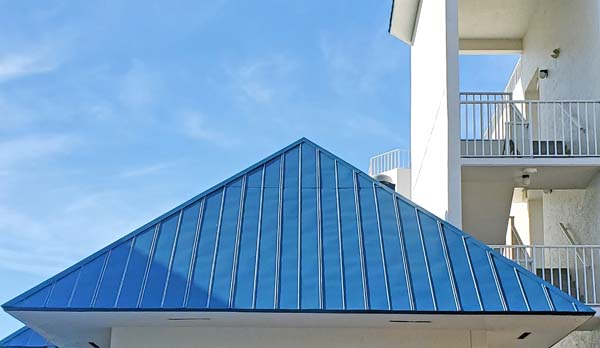Cool Roofing: Innovations for Energy-Efficient and Sustainable Homes


Revolutionizing Roofs: The Future of Cool Roofing Technologies
Cool roofing technologies represent a breakthrough in sustainable building practices, offering energy-efficient solutions that go beyond traditional roofing materials. Explore the innovations shaping the landscape of cool roofs and their significant impact on homes and the environment.
Understanding Cool Roofing: A Climate-Friendly Approach
Cool roofing is a climate-friendly approach designed to reflect more sunlight and absorb less heat compared to standard roofs. This is achieved through specialized roofing materials and coatings that have high solar reflectance and infrared emittance. The primary goal is to keep the roof surface cooler, reducing heat transfer into the building and minimizing the urban heat island effect.
High Solar Reflectance: Keeping It Cool
One of the key features of cool roofing technologies is high solar reflectance. This means that the roofing materials efficiently reflect a significant portion of the sun’s energy away from the building. Traditional dark-colored roofs can absorb up to 90% of solar energy, contributing to increased indoor temperatures. Cool roofs, on the other hand, reflect a substantial amount, keeping the building cooler and reducing the need for excessive air conditioning.
Cool roofing technologies redefine energy efficiency. To explore more, visit aracatinet.com.
Infrared Emittance: Radiating Heat Away
In addition to solar reflectance, cool roofing materials have high infrared emittance. This property allows the roof to radiate the absorbed heat back into the atmosphere efficiently. By emitting heat effectively, cool roofs prevent the buildup of thermal energy and contribute to a cooler indoor environment. This balance of reflectance and emittance creates a roofing system optimized for energy efficiency.
Cool Roof Coatings: Enhancing Existing Roofs
Cool roofing technologies extend beyond new roof installations. Cool roof coatings provide an innovative solution to transform existing roofs into energy-efficient surfaces. These reflective coatings can be applied to various roofing materials, including asphalt, metal, and modified bitumen. The application of cool roof coatings enhances solar reflectance and prolongs the life of the roof by reducing heat-induced wear and tear.
Environmental Benefits: Mitigating Urban Heat Islands
Cool roofing technologies offer significant environmental benefits, especially in urban areas. The urban heat island effect, where cities experience higher temperatures than surrounding rural areas, is mitigated by widespread adoption of cool roofs. By reducing the absorption and retention of heat, cool roofs contribute to a cooler urban environment, enhancing overall comfort and minimizing energy demand for cooling.
Energy Savings and Cost Efficiency
The energy-saving potential of cool roofing technologies directly translates into cost efficiency for homeowners. By maintaining lower indoor temperatures, cool roofs reduce the need for air conditioning, resulting in lower energy bills. The initial investment in cool roofing materials or coatings is often outweighed by long-term energy savings, making it a financially sound and environmentally conscious choice.
Regulatory Support and Incentives
Governments and municipalities recognize the environmental benefits of cool roofing technologies and often provide regulatory support and incentives to encourage their adoption. Some regions offer tax credits, rebates, or other financial incentives for homeowners and businesses choosing cool roofs. These initiatives contribute to the widespread adoption of energy-efficient roofing solutions.
Adaptability to Different Climates
Cool roofing technologies are adaptable to various climates, making them a versatile solution for different regions. While the primary focus is on reducing cooling energy consumption in warmer climates, cool roofs can also benefit colder climates by preventing heat loss in winter. The adaptability of cool roofing technologies makes them a viable option for homeowners across diverse geographic locations.
In conclusion, the evolution of cool roofing technologies marks a significant step towards sustainable and energy-efficient building practices. From reflecting sunlight to emitting absorbed heat and contributing to environmental and financial benefits, cool roofs redefine the way we approach roofing solutions. To explore the possibilities of cool roofing for your home, visit aracatinet.com and discover the innovations shaping the future of residential roofing.







